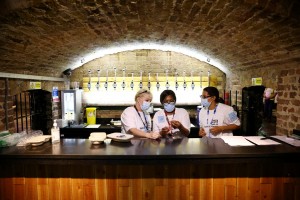UK criticized for COVID-19 booster plan
By ANGUS McNEICE in London | China Daily Global | Updated: 2021-09-17 09:20
NHS workers prepare doses of the Pfizer BioNTech vaccine behind a drinks bar at an NHS vaccination centre hosted at the Heaven nightclub, amid the coronavirus disease (COVID-19) pandemic, in London, Britain, Aug 8, 2021. [Photo/Agencies]
WHO says countries should not give 3rd jabs while poor nations wait for 1st
The World Health Organization, or WHO, has criticized the United Kingdom’s decision to move ahead with a major, 33 million-dose COVID-19 vaccine booster campaign, saying the treatments should instead go to parts of the world with low coverage.
The UK will begin distributing third shots on Monday, as part of an effort to top up immunity among vulnerable groups, healthcare workers, and people aged 55 and older. All those receiving jabs will have had their second COVID-19 vaccinations at least six months earlier.
But David Nabarro, the WHO’s special envoy for the global COVID-19 response, questioned the use of booster campaigns while billions of people around the globe are yet to receive a first treatment.
“I actually think that we should be using the scarce amounts of vaccine in the world today to make sure that everybody at risk, wherever they are, is protected,” Nabarro told Sky News. “So, why don’t we just get this vaccine to where it’s needed?”
The WHO had previously called on rich nations to suspend plans for booster campaigns this fall, in order to ensure supply is directed at low-income nations, where just 1.9 percent of people have received a first shot.
The UK has moved ahead with its booster campaign on the advice of advisory body the Joint Committee on Vaccination and Immunization. In a recently published COVID-19 response plan, the government said: “There is early evidence that the levels of protection offered by COVID-19 vaccines reduce over time, particularly in older individuals who are at greater risk from the virus.”
A review published on Monday in medical journal The Lancet said the evidence so far does not support the need for booster jabs in the general population.
Penny Ward, a professor in pharmaceutical medicine at King’s College London, said that, while the observed waning immunity among those vaccinated is low, a small difference is “likely to translate into significant numbers of people needing hospital care for COVID-19″.
“By intervening now to boost protection against disease-as observed in the emerging data from the booster program in Israel-this risk should be reduced,” Ward said.
She said the “issue of global vaccine equity is separate to this decision”.
“The UK government has already contributed significantly to global health and to protecting overseas populations against COVID-19,” she said. “However, their first duty, as the government of a democratic nation, is to protect the health and wellbeing of the UK population they serve.”
Other commentators have argued that it is within rich nations’ best interests to increase global vaccine coverage, in order to prevent the rise of new, more vaccine-resistant variants.
Michael Sheldrick, co-founder of the anti-poverty group Global Citizen, has called for the redistribution of 2 billion doses of vaccines to low-and middle-income regions by the end of the year.
“This can be done if countries don’t reserve boosters for use now purely for precaution when we need to prevent the emergence of ever more dangerous variants in undervaccinated parts of the world, and ultimately end the pandemic everywhere,” Sheldrick told China Daily in a previous interview.
Post time: Sep-17-2021


